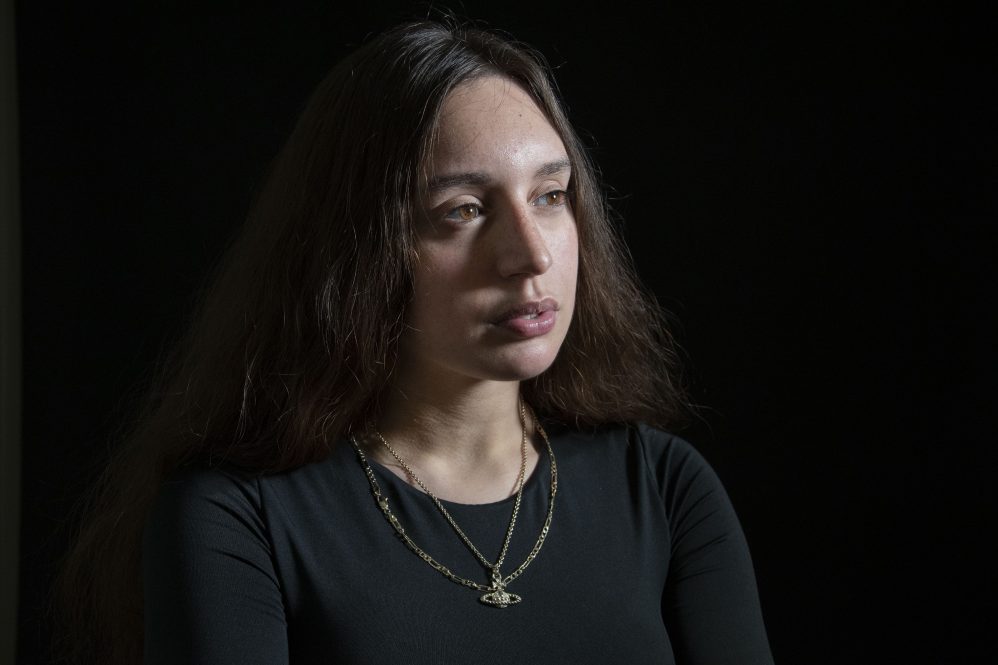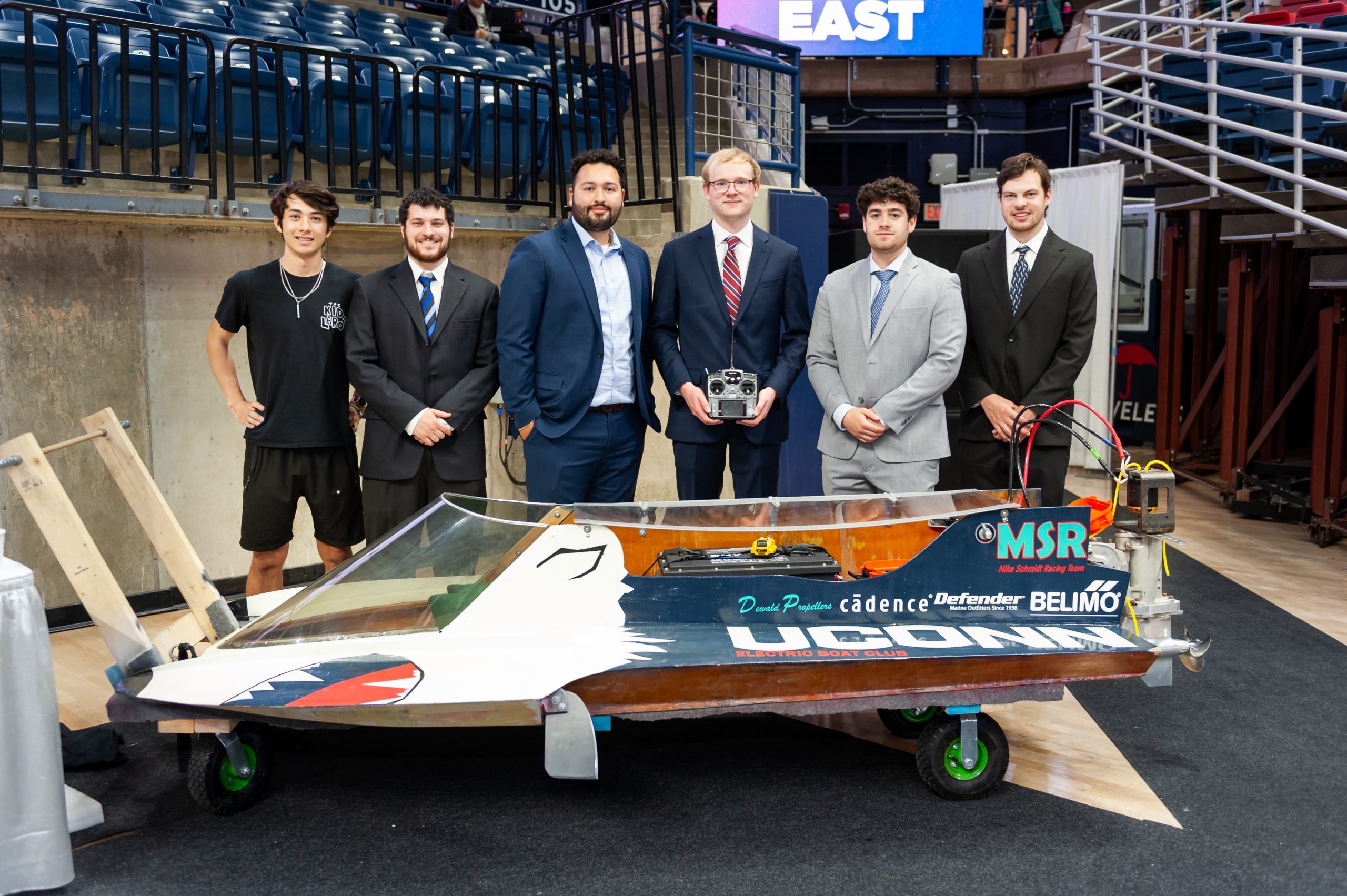She calls him “Loupa,” and he calls her “Star Child.”
And there isn’t anything in the universe that Genesis Rosario ’24 (CAHNR) wouldn’t do for Loupa – her grandpa, whose real name is Louis.
“I’ve learned that family is important, regardless of what you have,” she says.

Finding family has been a struggle for Rosario for most of her life. She doesn’t have a relationship with her parents. She hasn’t seen her only sibling, a half-sister, in a decade.
Throughout her childhood, she bounced around from place to place – mostly around Hartford, sometimes elsewhere. She lived with her grandparents, who are now divorced. Or with cousins. Or with her godmother.
“I’ve always been kind of displaced,” says Rosario, who now lives again with Loupa in Middletown, commuting to campus during her senior year after spending her first three years of college living in Storrs.
“Before I lived with my grandpa, there were just a lot of familial barriers that I went through where it was coming down to, like – I don’t know if I should pursue college. I don’t really have the support,” she says.
“But now, I’m at the end of my four years, and I can say that my mindset has changed so much.”
Illuminating
Rosario is many things all at once.
She’s a first-generation college student. An honors student. A McNair Scholar. A Rowe Scholar.
She’s an allied health sciences major, and a health professions peer advisor in UConn’s pre-med office.
She’s a member of the UConn Community Services Days team, and a hospice volunteer.
She’s proud of her Puerto Rican, Dominican, and Italian heritage.
And she’s part of the LGBTQ community.
“I didn’t really understand my identity coming into college,” she says. “I’m mixed with a whole bunch, but I found out, and I’m proud of my identity.”
A graduate of New Britain High School, the school’s Health Academy was where she started to pursue opportunities in and around health care.
With medicine, not only do you learn to help others, but you get to critically analyze yourself
She started working as a lifeguard when she was 15 years old, teaching water safety to children, and took certified nursing assistant courses in high school. Her studies through the Health Academy took her on rotations into health clinics, introduced her to hospice care, and illuminated for her how health care was about a lot more than just treating illnesses.
“With medicine, not only do you learn to help others,” Rosario says, “but you get to critically analyze yourself and know where you’re coming from.”
With her personal history, she originally thought about pursuing social work, but instead decided she wanted to be a doctor one day – a family medicine physician, in particular. In the community where she grew up, people don’t trust doctors, or seek out medical care, or have a whole lot of trust in the health care system.
She wants to help change that.
Her reason for choosing UConn over the other schools she was accepted into was a practical one – it was close to Loupa, who has lived with various medical conditions for some time.
“The only family support I had in Connecticut was my grandpa, really, going into college – I really didn’t want to leave him,” she says. “I definitely didn’t think I could bear that, if something happened to him. Because he has been my anchor throughout this.”
Shifting
After Rosario’s junior year, something did happen to Loupa – he got really sick.
While she loved campus life and working as a residential advisor in the dormitories in Storrs, she gave it up, and went back to live with her grandfather and help take care of him.
The change was hard at first.
But looking back on it now, she says that moving home actually opened doors that she didn’t expect.
She got an internship at Middletown’s Health Department. She took an EMT training course, and started working toward gaining clinical experience. She started studying for the MCAT exam, a requirement for the medical school admission that she hopes to earn one day.
The only family support I had in Connecticut was my grandpa, really, going into college – I really didn’t want to leave him
She poured herself into her honor thesis research, which is focused on post-birth warning signs for post-partum depression in women between the ages of 16 and 24.
She’s working on her graduate school application – she’s applying to UConn’s masters’ in public health program, hoping to earn an MPH before going on to medical school.
All while bringing Loupa to his medical appointments and helping him manage his health. And he’s gotten better – his health has improved over the last several months of care.
“Every day, he gets into the garage around 3:00 p.m., and he watches his projecting movies,” she says, “Every time, before I go into the house, I go into the garage, say hi to him, and say, ‘I’m going to go on the computer, type all night, love you!’”
Iridescent
Rosario’s emotions burn as bright as the stars her grandfather nicknamed her after.
“I come from a place where I have learned in clinical settings, in general, to disassociate your emotions from what you’re doing,” she explains. “Behind closed doors, will I cry? Yeah.”
She doesn’t like to focus on the negatives, though, or the challenges she’s had to overcome in life.
That’s one of the reasons that Rosario exemplifies what higher education is all about, according to Micah Heumann, the director of UConn’s Office of Undergraduate Research who has become a sort of mentor for Rosario over the last year.
“Genesis comes to UConn ready to explore and engage in as many opportunities as possible, and then looks for ways to give back to the UConn community,” says Heumann. “Genesis spends the time to get to know each person they come into contact with, asks questions, and listens. She continues to overcome so many obstacles, and yet always looks for joy in the world, in others, and herself.”
Once you find, and remember, who you are, it will outweigh all the negatives where you felt like you were alone
Rosario says she doesn’t want hers to be a sob story, but she hopes that by sharing herself another student, someone who maybe also felt displaced in life, who might have had an inner-city upbringing, or who also questioned whether they have what it takes to make it at college might find some inspiration.
“Looking back, these experiences helped make me who I am,” she says.
“Once you find, and remember, who you are, it will outweigh all the negatives where you felt like you were alone, where you felt like people were underestimating you and you didn’t know why, where you were feeling frustrated. It will outweigh everything. The equation will cancel out, and you will be able to see yourself, on the top in your own life.”
Like a lot of this year’s graduating class, Rosario didn’t get to have a traditional high school graduation during the pandemic in 2020 – it was, instead, of the drive-through variety, in a parking lot and held over two days. She couldn’t share it with her closest friends – their names were too far apart in the alphabet.
This year, when she graduates from UConn, she’ll finally get to experience all the pomp and circumstance she’s been working for – and Loupa will get to be there to experience it, too.
“I think that day is going to be very iridescent – it’s going to be very illuminated. Fluorescent,” she says. “He’s going to see my eyes – I’m going to be crying a lot, but they’re going to light up 10 times.”
Genesis Rosario’s internship with the Middletown Health Department was made possible by a Connecticut Department of Health program administered by Yale School of Public Health. The CT Public Health Fellowship Program works to cultivate placement opportunities and support students through their internships.



